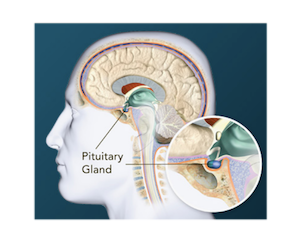
Pituitary Gland Function
Pituitary Gland Function
The pituitary gland function is extremely important to your body because it handles and directions numerous functions that are required to live each day.
In fact, the pituitary gland is so significant that it is also known as the “Master Gland”. The pea-sized, Master Gland gland directs other organs to do function.
The pituitary gland has three lobes: anterior lobe, immediate lobe, and posterior lobe. The major two lobes of the pituitary gland are the anterior lobe and posterior lobe.
Each pituitary gland lobe has its own function:
- The Anterior Lobe is greatly involved in the development of the body, reproduction and sexual maturation. The hormones produced by the anterior lobe regulate growth and stimulate the adrenal glands, thyroid glands, ovaries, and testes. The anterior lobe also generates prolactin, which enables new mothers to produce milk.
- The Intermediate Lobe of the pituitary gland releases a hormone which stimulates the Melanocytes. The Melanocytes are cells that control pigmentation through the production of melanin.
- The Posterior Lobe produces the antidiuretic hormone. The antidiuretic hormone helps the body prevent dehydration by retaining water from our kidney and conserving the water in our bloodstream. Oxytocin is another hormone produced by the posterior lobe. Oxytocin aids in uterine contractions during childbirth and stimulates the production of milk after childbirth.
If pituitary gland function is compromised then the result can range from feeling uncomfortable to a fatal Adrenal Crisis.
An Adrenal Crisis occurs when the pituitary gland is unable to signal the adrenal gland to release cortisol.
The pituitary gland function responsible for releasing the following hormones:
- Growth hormone (GH) is essential in early years for growth in children and to maintain a healthy body composition.
- Puberty hormones (or gonadotrophin) LH, FSH ensure normal function of the ovaries and testes.
- Thyroid stimulating hormone (TSH, stimulates the thyroid gland to make Thyroxine)
- Prolactin stimulates the breast milk production.
- Adrenocorticotropic Hormone (ACTH, controls cortisol release)
- Antidiuretic hormone (ADH) signals the kidneys to increase water absorption.
When the pituitary gland produces an excessive hormone or does not release sufficient hormones more then a dozen different disorders of the endocrine system can result.
Here is a list of different pituitary gland diseases that can occur if the pituitary gland does not function properly:
|
Diseases Caused by Pituitary Gland Disorders |
Caused By | Hormones Affected |
| overproduction | growth hormone | |
| overproduction | adrenocorticotropic hormone | |
| under production | growth hormone | |
| overproduction | vasopressin | |
| under production | vasopressin | |
| under production | any pituitary hormone | |
| Pickardt-Fahlbusch-Syndrome | under production |
any pituitary hormone, except prolactin, which is increased |
| overproduction | any pituitary hormone | |
| under production | any pituitary hormone |
I hope this webpage provides you with a better understanding of, "Pituitary Gland Function"
Your pituitary gland function plays a significant role in your body's health and well-being.
If you find the pituitary gland function insightful then you may find these other web pages helpful:
- What Is Sheehan's Syndrome?
- What Are The Symptoms of Sheehan's Syndrome?
- What Is Sheehan's Syndrome Caused By
You can read about HypoGal's shortcuts to living with a chronic illness on her HypoGal Blog.
Please, Like, HypoGal on Facebook.
"Play it forward so others do not have to unwind." XO, HypoGal
